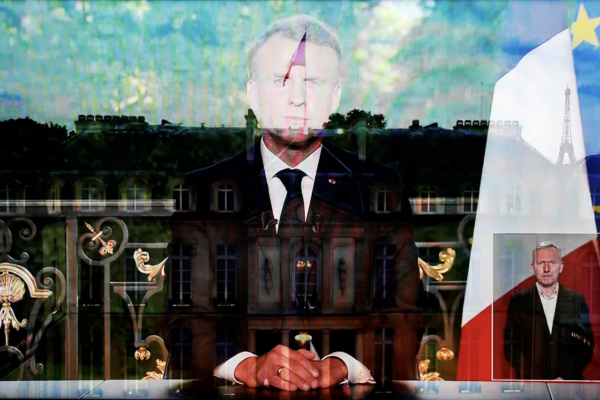President Macron made the announcement during a televised speech.Ludovic Marin / AFP – Getty Images
LONDON — With the far right surging in Europe, France’s leader has taken a colossal gamble to try to halt its ascendency.
President Emmanuel Macron said Monday that he was “confident” his compatriots would “make the right choice” after he stunned the nation by calling a snap election.
He may hope to stop the far right in its tracks. But he also risks handing them domestic power, hobbling the final years of his centrist premiership while overshadowing a summer that was due to be one of celebration at the Paris Olympics.
Macron’s surprise announcement followed European Parliament elections, held Thursday to Sunday, which saw the anti-immigration and climate-skeptic right make huge gains in the country and the continent’s other powerhouse, Germany.
Ballots for the 360 million voters in the European Union were still being counted Monday. And though the far right’s successes were not as strong elsewhere, in France it won by a landslide.
Marine Le Pen’s National Rally received double the votes of Macron’s centrists — a drubbing so brutal that the president felt compelled to call the snap legislative election for the end of this month.
“I have heard your message, your concerns and I will not leave them unanswered,” Macron said in an address to the nation Sunday night. “France needs a clear majority to act in serenity and harmony.”
The president “has taken an enormous gamble — with his own reputation and legacy, as well as on the future of France,” Mujtaba Rahman, a managing director at the New York consultancy Eurasia Group, wrote on X. Though Le Pen will find it far harder to win a domestic election than a European one, “the risk of an accident here is much greater,” Rahman added.
Across Europe, the elections were a signal that the political center of gravity is lurching to the right.
These were not elections to choose national governments, but rather a separate vote to elect lawmakers for the European Union’s 720-seat Parliament.
Though seen as less important than domestic elections, the European Parliament is nevertheless hugely consequential, not just in terms of policy — including on climate change — but also setting the continent’s political tone for the next five years and beyond.
With the United States nearing its own electoral pivot point in November, its relationship with Europe has perhaps never been more in flux.

Though the far right triumphed in France and elsewhere, there has also been a sizable backlash among its horrified opponents. On Sunday night, several hundred people demonstrated in central Paris. Arnaud Finistre / AFP – Getty Images
The European Parliament vote was not quite the far-right sweep that some in the mainstream had feared, however.
The center-right won in Germany and did well enough elsewhere to increase its general dominance of Europe’s legislature. Meanwhile the center-left bloc largely held firm.
“We are the anchor of stability,” Ursula von der Leyen, president of the E.U. Commission, told supporters of her center-right group in Brussels. “This is a great message to all of us.”
Scandinavia bucked the trend of right-wing gains, with populists losing ground in Sweden, Denmark and Finland. However, liberal, green and leftist parties continentwide took a hammering at the expense of the nationalist right.
In Germany, the Alternative for Germany, or AFD, weathered a string of pre-election scandals to overtake Chancellor Olaf Scholz’s Social Democrats as the country’s second-largest party in Europe.
Italy’s far-right Brothers of Italy, led by Giorgia Meloni, doubled its seats in the assembly.
But, by far, the biggest upheaval came in France, where National Rally was projected to get around 32% of the vote, versus 15% for Macron’s Renaissance party.
Though Le Pen leads the party, its European efforts were spearheaded by far-right poster boy Jordan Bardella, 28.
“Tonight, our compatriots have expressed a desire for change,” he said. “Emmanuel Macron is tonight a weakened president.”
The president quickly called the legislative election to be held across two rounds June 30 and July 7. Bardella, the rising star of French politics, will be Le Pen’s candidate for prime minister.
It adds to an already packed summer for France, the latter date coming less than three weeks before it hosts the Olympics.
International Olympic Committee President Thomas Bach said there would be no issue, but Paris’ socialist mayor Anne Hidalgo said that calling a ballot so close to the marquee sporting event was “unsettling.”
The position of the French president himself will not be put to a vote. He has three years still left on his term after a convincing defeat of Le Pen in 2022. But he risks handing her party power in the French legislature.
This could mean a messy and combative period of power-sharing between centrist Macron and his far-right rival — hampering a man eager to be seen as Europe’s de facto world leader.
Macron hopes that — when confronted with Le Pen’s policies in a domestic election — voters will reject them and thus nix the far-right’s momentum, according to Rahman at Eurasia Group.
“Calculated risk or mad gamble?” Rahman said. The stakes are high and Macron’s gambit could easily backfire, he added. “France is restless.”
NBC News


Leave a Reply
You must be logged in to post a comment.